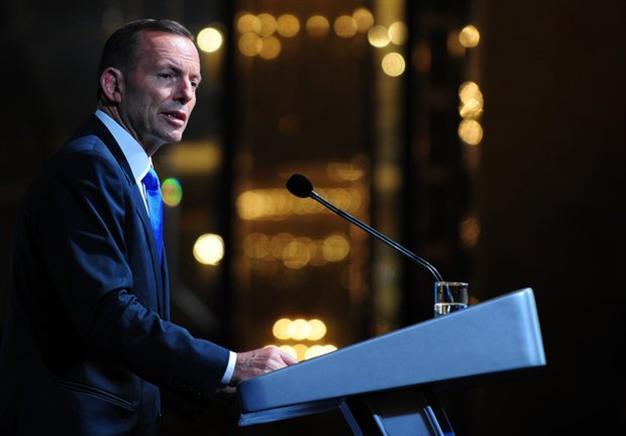Turnbull topples Australian premier Abbott
SYDNEY - Agence France-Presse

This file picture taken on June 29, 2015 shows Australia's Prime Minister Tony Abbott speaking during the 35th Singapore Lecture in Singapore. AFP photo
Australian conservative Prime Minister Tony Abbott was dramatically ousted Sept. 14 in a snap party vote forced by challenger Malcolm Turnbull, a millionaire former banker who will become the nation's new leader.Abbott, who came to power in a decisive general election victory in 2013, was forced into a leadership ballot among his Liberal Party colleagues after Turnbull said the coalition government faced defeat without change at the top.
"I will be a candidate and I expect to win," Abbott said ahead of the ballot, before losing 44 to 54.
Foreign Minister Julie Bishop, who had reportedly sided with Turnbull to call on Abbott to quit earlier in the day, retained her position as deputy leader of the Liberal Party by 70 votes to 30.
In the current parliament, whoever leads the Liberal Party becomes prime minister as head of the conservative coalition in which it is the senior partner.
It is not the first time in recent years that an Australian prime minister has been removed by a party room coup, with Labor premiers Kevin Rudd and Julia Gillard both suffering the same fate in 2010 and 2013 respectively.
Moves against the unpopular Abbott had been in the works for months.
He survived a leadership challenge in February after poor polling, policy backflips and an unpopular budget generated a backbench revolt, fuelled by questions about the prime minister's judgement.
No challenger emerged then, after a vote on whether there should be a leadership contest was defeated 61 to 39.
But in the months since, Abbott has failed to turn around the polls, bolster the economy or stop damaging leaks from within his party.
Turnbull, a former barrister and entrepreneur who represents an upmarket Sydney electorate, argued earlier Sept. 14 that the government's message was not getting through and that a new, more open, approach was needed.
The popular communications minister, long considered one of the most credible alternatives to Abbott, quit the cabinet in a shock move that triggered the party ballot.
"This course of action has been urged on me by many people over a long period of time," Turnbull said ahead of the vote.
"We need a different style of leadership."
The next national election, which must be held by mid-January 2017, is expected to be called some time next year and Turnbull said failure to change would mean losing power to Labor leader Bill Shorten.
"If we continue with Mr Abbott as Prime Minister, it is clear enough what will happen. He will cease to be prime minister and he'll be succeeded by Mr Shorten," Turnbull said.
Australian politics can be a brutal affair, with party leaderships switching rapidly after often vicious and sudden coups.
Turnbull previously led the Liberal Party in opposition before being ousted by Abbott in late 2009. Abbott then lost the 2010 election to Labor's Julia Gillard, but led his party to a resounding victory in 2013.
Turnbull said Monday that Australia needed a style of leadership "that respects the people's intelligence, that explains these complex issues and then sets out the course of action we believe we should take".
"We need advocacy, not slogans," he said.
The Labor Party has enjoyed a solid lead over the government since last year, with a Newspoll survey last week finding 63 percent of voters dissatisfied with Abbott's performance.
















